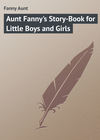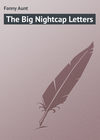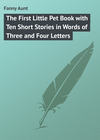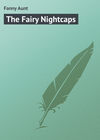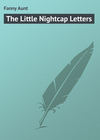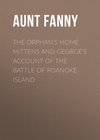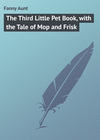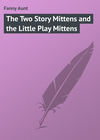Loe raamatut: «Aunt Fanny's Story-Book for Little Boys and Girls», lehekülg 4
THE TWINS
"Well, Susan," said her Father one day, as she came home from school, "I am glad to see you; I wish to inform you that two young gentlemen arrived here to-day."
"What are their names, Father?" asked Susan.
"I do not know," answered her Father – "I do not believe they have got any names. They are very small – so small, that at this moment they are both asleep in the great chair."
"Both asleep in the great chair?" cried Susan, astonished at what her Father had said. "I do believe you have been buying two little monkeys."
"No, I have not," said her Father, laughing.
"Now come with me, and I will show you these strangers, and then see if you will say they are monkeys."
Susan went with her Father. He took her hand, and led her into her Mother's room. The room was dark, and her Mother was lying in the bed. Susan was afraid that she was sick. She went to her and said —
"Dear Mother, are you sick? You look very pale."
Her Mother kissed her, and said, "I am very weak, my dear child; but do you not want to see your little brothers?"
"Brothers? – where?" cried Susan. "Have I a brother?"
"Two of them," said her Father. "Come here, Susan, here they both are, fast asleep."
Susan went up to the great easy chair, and in the seat of it she saw, all tucked up warm, two little round fat faces lying close together. Their noses nearly touched each other, and they looked funny enough.
"Well, Susan," said her Father, "do you like the monkeys?"
"Oh Father!" answered the little girl, clasping her hands, "I am so glad – I am so happy! They are exactly alike – how I shall love them, the dear little toads."
"Toads," said her Father, laughing; "they don't look a bit like toads."
"Well, I said that because I loved them so," replied Susan, "just as you sometimes call me your little mouse."
For two weeks, the little twins slept together in the great chair, and there was no end to Susan's wonder and delight. Her Mother had to tie a bit of red silk around the wrist of one of them, to tell them apart. They grew very fast, and were the dearest little fellows in the world, they had such bright merry black eyes, and were always ready to have a frolic with Susan. As they grew up, they were so good, and so pretty, that every body loved them, and a great many people came to see them. I forgot to tell you that one was named George and the other James.
One day, when the twins were three years old, they were left alone in the breakfast room. The things on the breakfast table had been cleared away, except a bowl nearly full of sugar, which was standing on the table.
Presently the little fellows spied the bowl of sugar. "George," said James, "if you will help me with this chair, I will give you some sugar."
So both the boys took hold of the heavy chair, and dragged it to the table. Then James helped George to climb upon it, and from that he scrambled up on the table. He walked across, to where the sugar was, and sat down on the table, and took the sugar bowl in his lap.
"Now you get the bench," said George.
So James got the bench, and put it close to the side of the table where George was, and stood upon it.
You should have seen how their merry black eyes sparkled, at the fine feast they were going to have. They did not think that they were doing wrong, for their Mother had often given them a little sugar.
So George took the spoon that was in the sugar, and helped James to a spoonful, and then took one himself. He was very particular to give James exactly as many spoonfuls as he took himself.
They were having such a delightful time, that, for some moments, they did not speak a single word. George began first —
"This is nice," said George.
"I like sugar," said James.
"It is so sweet," said George.
"And so good," said James.
"We will eat it all up," said George.
"We won't leave a bit," said James.
"It is most all gone," said George.
"There is hardly any left," said James.
All this time they were talking, George had been stuffing his brother and himself with the sugar.
Just then their Mother opened the door. She had opened it softly, and the little boys had not heard her. When she saw them so busy – with their round faces stuck all over with crumbs of sugar, and George sitting on the table, dealing it out so fairly – she could not keep from laughing.
The twins heard her laugh, so they laughed too; and George cried out – "Mother, this sugar is nice – I like it."
"And so do I," said James.
Their Mother lifted George from the table, and told them they must not do so again, for so much sugar would make them sick. She washed their faces, and sent them to play in the garden. There was a fine large garden at the back of the house, where they could play without danger.
Three years after this, the twins were sent to school, where they soon became great favorites, because they were amiable, and good, and always willing to do as they were told. They looked so exactly alike, and were dressed so exactly alike, that often very funny mistakes were made. I will tell you something that happened, that was not funny, but it will show you how hard it was to tell which was George, and which was James.
One day, the teacher gave the twins a spelling lesson, and told them that they must know it perfectly that morning.
Now George, for the first time, was naughty, and instead of learning the lesson, he was making elephants and giraffes on his slate; but James studied his lesson, and soon knew it. Presently the teacher said, "James, do you know your lesson?"
"Yes, sir," said James. He went up to the desk and said it very well.
"You know it perfectly," said his teacher; "you are a good boy. Now go to your seat."
In a few moments he said, "George, come and say your lesson."
But George did not know a word of it; and James whispered to him, "I don't want you to be punished, brother; I will go for you and say it again."
So James went and repeated his lesson. The teacher thought of course it was George; he said, "Very well indeed, George; you know it just as well as James: you are both good boys."
When George heard this praise, which he did not deserve, he was troubled. He had been taught never to deceive. He did not think at first how wrong he had been; now, he saw plainly, that it was very wrong; that he and his brother had been acting a lie.
He whispered to James, "Brother, I can't bear to cheat, so I will go right away and tell the teacher."
So he went directly up to the desk, and said, "Sir, I have not yet said my lesson."
"Why, yes you have," replied the teacher, "I have just heard you say it."
"No, sir, if you please," said George, "I do not know it at all. James said it twice, to save me from being punished."
"Well, George," replied his teacher, "I am very glad you have told me this. I never should have found it out. But your conscience told you that you were doing wrong; and I am thankful you have listened to its warnings, and made up your mind at once, to be an honest boy. I will not punish you, or James, for I am sure neither of you will do so again."
The little boys promised him they never would – and they never did. They grew up honest and good.
Some other day, I will tell you more about them.
THE LITTLE BOY THAT WAS AFRAID OF THE WATER
Once on a time, there were two little boys. William was five years old, and Johnny was not quite three. The weather was very warm, and these little boys got very weak, and looked so pale and sick, that the doctor said their parents had better take them to Newport, and let them bathe in the surf. So their Mother packed up their clothes, and some books, for she did not wish them to be idle; and, one pleasant afternoon, they all went on board of the steamboat that was going to Newport.
The little boys were very much amused at all they saw. There were a good many other boys in the boat, and William and Johnny looked very hard at them, and wished they knew what their names were, and whether they had a Noah's Ark and Velocipede like theirs.
After they had had their supper, their Mamma put them to bed in a berth. I suppose you all know what a berth is. It is a narrow bed, fastened to the side of the cabin. Sometimes there are three, one above the other; and sometimes two. These little boys got into one of the under ones, so that, if they rolled out, they would not be as likely to hurt themselves. They thought it was very funny to be squeezed up in such a little bed. William counted twenty babies in the cabin. Some of these babies cried a great deal; yet, for all that, the boys were fast asleep in a very few minutes, and slept very soundly all night.
The next morning, their Mamma came to their berth and said, "Come, William – come, Johnny, it is time to get up – for we are at Newport, and must go on shore as quickly as we can."
"Are you going to put me into the water now?" said Johnny, beginning to look very much frightened, for Johnny was afraid of the water.
"Oh, Johnny, don't be so foolish," cried William: "why, I should like to go in head over heels. Mamma, don't they duck us?"
"I believe they do," replied his Mother.
William now begged his Mother to let him go out of the cabin, as he was all dressed. She said he might stand just outside of the door, and, if he saw his Father, he might go to him, but he must never run about the boat alone.
In a few minutes they all went on shore, and got into a carriage, and were driven up to the Hotel.
After breakfast, William and Johnny walked down to the smooth and beautiful beach with their parents, where a great many people, some of them children, were bathing. They seemed to like it very much; and it really did look very inviting, for the sun made the water sparkle like diamonds, and the waves seemed dancing and leaping, and looked as if they longed to give every body a good splashing.
William was delighted. He could hardly wait for his Father to undress and put on his bathing clothes, he was in such a great hurry to be ducked; and when his Father took him and plunged him under the water, although he gasped for breath, he laughed, and kicked, and splashed the water at his Father, and cried, "Duck me again, duck me again, Papa," and he looked so pleased, that some other children, with their parents, came to where he was, and they all had a grand frolic together.
Little Johnny laughed too, as he stood on the dry ground; but, when his Father said, "Come, Johnny, now it is your turn," he made a terrible face, and cried "Dear Papa, dear Mamma, please let me go home. I shall never see you again if you put me in that great big water." But his Mamma said he must go in, because it would do him a great deal of good, and she undressed him, and put him into his Father's arms.
Johnny now began to scream as loud as he could, and cried out, "Mamma, Mamma, I want to go back to you." But his Father did not mind him a bit, and holding him by his arms, he plunged him under the water.
The poor little fellow came up gasping and panting, and sobbed out, "Oh! my dear Mamma, come and kiss me 'fore I die."
Every body laughed – for there was no danger – except his kind Mother. A tear stared to her eye, for she knew her dear little son really thought he was dying, and would never see her again. But in a little while he felt better, and, after his Mother had taken him, and had rubbed him all over and dressed him, and he had run up and down the beach with William and the other children, he felt such a nice warm glow all over him, that he forgot all about his fright.
Pretty soon he said, "Mamma, I am so hungry – I am as hungry as a little bear."
"That is because you have been in the water," replied his Mother.
"Are the fishes always hungry? – does the water make them hungry too?" said Johnny.
"I believe they are always ready to eat," replied his Mother; "you know that they are caught by bait. This bait is a bit of a clam or a little worm, put upon a sharp hook. The fish snap at the bait, and the hook catches them in the mouth. Come, little hungry fish," added his Mother, "and I will give you something to eat; but I will not put it on a hook to hurt you."
The next day the little boys went into the water again, and, although Johnny made up a doleful face, he did not think he should die this time; and, when he saw the other children laughing and splashing each other, and crying "Duck me again – what fun we are having," he tried to like it too, and after a little while did begin to like it; for, when children try to overcome their foolish fears, they will almost always succeed, and be rewarded as Johnny was, by the pleasure they enjoy, and the happiness they give to their parents.
After a few days, Johnny got to be so brave, that he was the first to run down to the beach and jump into his Father's arms, and he cried louder than any, "Duck me again," and splashed every body that came near him; and both William and Johnny got so strong, and ate so heartily, and had such great red cheeks, that when they went home to New-York, a few weeks after, their friends hardly knew them, and Johnny never again had any foolish fears about going into the water.
THE MAY QUEEN
"Mother," said Frederick Stanley, "is it not wrong to treat servants unkindly?"
"What makes you ask that question?" answered his Mother. "What can have put that into your head?"
"Nothing – I don't know," replied he, looking at his sister Kate, who was sitting near him, working a pair of slippers.
Mrs. Stanley saw that there was something on their mind, so she laid down her book, and tried to draw it out. She began:
"What is the reason that your little Scottish friend Jessie has not been here lately? I thought that you, Kate, could not take a walk, with any pleasure, without her, and Fred has become quite a beau, since her arrival. I am afraid you have done or said something to offend her."
"Fred," said Kate, – who was two years younger than her brother, and much smaller, and had a great respect for him, – "Fred, do you tell Mother."
Fred gave his pantaloons a little pull, shook the hair away from his face, half laughed, and did not speak a word; but Kate, like a real little woman, could not keep the secret a moment longer. "We have had a quarrel, Mother; that's all!"
"'A quarrel! that's all!'" said her Mother. "That's a great deal too much; but what did you find to quarrel about?"
"Why, Mother," answered Fred, getting over his bashfulness, now that the secret was out, "it was all about treating those who were beneath us with kindness."
"Well done!" exclaimed his Mother. "Let us hear what you had to say upon the subject."
"I said it was a shame to abuse those who were poorer than we were; that in God's eyes all were equal. I could not bear to hear Jessie say that she had her own servant at home, and when this servant did any thing to displease her she would pinch and slap her. I told her she was a downright wicked girl."
"Oh, shocking! shocking!" said Mrs. Stanley. "And my sweet little Kate, did you too stand up for kindness to servants?"
"I did all I could, dear Mother," she replied, "but Fred did the most."
"Well, tell me, what else did you say."
"I told her," said Fred, hesitating a little, "that here in our own country, we said 'if you please' and 'thank you,' when a servant did any thing for us, and that she had better go back to Scotland, and not stay another day in a place where she was deprived of the pleasure of pinching people."
"Oh, Frederick! Frederick! how could a boy of your politeness be so rude to a young lady? That was a great mistake."
Frederick looked mortified, and Kate hung her head. "But what happened after that?" asked Mrs. Stanley.
"Oh, she was so angry that she went away, and we have not seen her since. I am very sorry; but it can't be helped now."
"No," said Kate, "we can't help it now."
"But, my dear children," said their Mother, "I think you owe Jessie an apology."
"I have no objection," said Fred, after reflecting a moment, "if you think I have been so very impolite; but it will do no good."
"Well," said Mrs. Stanley, "it must be done. Perhaps I can assist you in making up the quarrel. Next Thursday, you know, is the first of May. You shall have a little party, and Jessie shall be Queen of May. That will be certain to please her."
"Jessie! Queen!" exclaimed Kate. "You can't, Mother, you can't. Jessie will not come; I am sure she will not come. I do not believe she will ever speak to us again."
"I tell you she will come," said her Mother; "and she will be Queen. I will manage it for you."
"Ah, well, Mother," said Fred, looking at his sister, "you don't know Jessie as well as we do. She won't forgive us so easily."
Company now came in, and the children went to their studies. In the afternoon Mrs. Stanley sent a polite invitation to Jessie and her parents to pass the next Thursday evening at her house, and as they were sitting at the tea-table, the answer was returned.
"There," said Mrs. Stanley, "one point is gained; they will all come."
"They may come," said Frederick, "but she won't be civil to us, I know."
The next day was spent in preparing the crown, throne, and flowers, &c., and Frederick set himself to work to learn by heart some lines his Mother had written for the occasion.
Thursday evening arrived, and the children, though afraid of Jessie's cold looks, were in good spirits. Kate came into the parlor, and found Fred before a large glass, making his speech, and practising the most graceful bows and gestures.
"Goodness!" she exclaimed, "how light and beautiful the room looks! Oh, Fred, I hope we shall have a pleasant time."
The arrival of the company now interrupted them, and when nearly all had come, Mrs. Stanley told her plan with regard to Jessie; and this important matter was just settled, when that young lady and her parents entered.
Jessie, not knowing the honor awaiting her, was very stiff and grave in her salutations. Her large dark eyes were turned away from Fred and Kate, yet an expression about her pretty mouth seemed to say,
"I am not so very angry as you think."
"She looks like a Queen, don't she?" whispered Fred to his sister.
"She is stiff enough, at any rate," said Kate.
"I wonder who she will choose for her King?" said Fred.
"I am sure I don't know," answered Kate, looking round. "I suppose the biggest boy."
"Dear me!" said Fred, "I forget that I must go out until it is time for the Address," and he left the room, to await his Mother's signal.
Refreshments were now handed round the room, and many a sly glance was cast upon the unconscious Jessie, who was still looking very grave, and almost cross, till, at a hint from his Mother, Fred made his appearance, and with blushing face, but firm voice, pronounced the following lines:
"O! valiant knights, and ladies fair!
I'm very glad to see you here;
Your happy looks and eyes so bright,
Have quite inspired me to-night.
Though I'm unused to courtly ways,
My choice from you will meet with praise.
Our Western land, so brave and free,
Where waves the flag of liberty,
Can yet, while all our hearts approve,
The British stranger fondly love.
(No looks of grave distrust are seen,)
Fair Jessie! I proclaim you Queen!
And kneeling lowly at your feet,
To be your knight I do entreat.
Now deign to say what happy one
Amongst us all shall share your throne."
Fred rose from his knees, and awaited Jessie's reply.
Her anger was all gone, but she was so surprised that she looked down and did not say a word.
"Well," thought Fred, "I knew she would act so. I suppose every body is laughing at me."
"Jessie," said her Mother, "speak quickly." "Whom will you have for King?"
Jessie blushed, and smiled, and whispered in a soft little voice, "Frederick."
Astonished and delighted by this kindness, Fred again kneeled down, then rising he took her little white hand, and led her in triumph, followed by all the company, to the next room, where a splendid throne had been erected. A beautiful crown of flowers was placed on Jessie's head, and gave new beauty to her soft and curling brown hair. Frederick also had a handsome crown. Sceptres were placed in their hands, and then they arranged their court. Kate was made a Duchess, at which she grew quite dignified; there were plenty of Earls and Countesses, and the sweet little maids of honor and the pages stood behind the throne.
